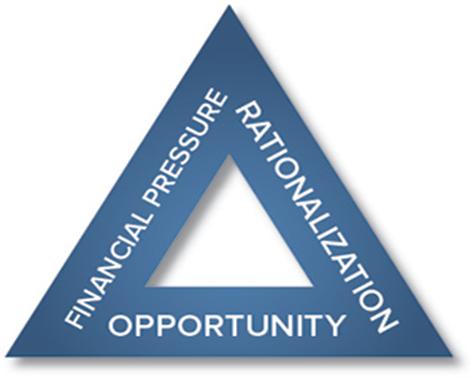The 2022 Association of Certified Fraud Examiners’ Report to the Nations (“ACFE Report”) estimates that the average fraud scheme lasts 12 months, costing organizations a median loss of $117,000 per case before detection. However, frauds committed by long-tenured employees and those with a higher level of authority are responsible for even higher losses.
Automobile dealerships, by their very nature, are highly susceptible to fraud. The changes in dealership operations resulting from the pandemic, which often relaxed internal controls and relied heavily on a small contingent of employees, created greater opportunities for fraudsters.There is no time better than today to understand your dealership’s fraud risks, develop or improve effective detection measures, and have a plan to respond when fraud has been detected.
Understanding Fraud Risks
Over seven decades ago, Donald R. Cressey, a well-known criminologist researched the behaviors of those convicted of embezzlement and developed the theory of the Fraud Triangle, a three-part model for explaining the factors that motivate occupational fraud, or fraud committed by employees against their employers. Under Cressey’s model, three distinct elements increase the likelihood of fraud: Financial Pressure to act, Opportunity for the act to occur, and Rationalization of the fraudulent actions.

Financial pressures faced by employees has always been present. However, during the pandemic, employees encountered reduced family income, health concerns, and economic uncertainty, which provided a greater incentive to commit fraud. Ultimately, the chaos and uncertainty of the coronavirus crisis provided a basis to rationalize fraudulent behavior, which might have otherwise been checked by the employee’s internal ethical code. Although perpetrators of fraud have always found a way to justify unethical behavior, the pandemic provided fraudsters with additional reasons to rationalize their actions.
Alarmingly, the ACFE Report indicated that pandemic-related issues, such as changes to staffing, operational processes, and internal controls, were contributing factors to 52% of frauds – a statistic that can’t be ignored. At dealerships, the pandemic resulted in the “trimming” of staff and the implementation of new processes and procedures which relaxed historically weak internal controls. In addition to trimming staff as a result of the pandemic, dealerships faced the natural back-office turnover with increased difficulty in hiring replacement staff. This often resulted in a reduction in the number or quality of accounting staff. While control procedures weakened, and staff headcount decreased, dealerships received substantial injections of cash in the form of Paycheck Protection Program (“PPP”) loans, Economic Injury Disaster Loans (“EIDL”), and Employee Retention Credits (“ERC”) and increased profitability. Accordingly, at the same time employee incentives to commit fraud increased, the company’s defenses against fraud weakened, providing employees with more opportunities to commit fraud.
Dealerships are unique businesses that are inherently susceptible to fraud. Since a dealership contains multiple “units” of operations, including new sales, used sales, service, and parts, dealerships must understand the risks inherent in each area to effectively monitor and manage fraud. There are a multitude of other factors which contribute to fraud risks within dealerships:
- Dealerships are highly capitalized and typically have a large volume of transactions, creating the availability of funds and opportunities for fraud;
- In addition to cash, dealerships employees have access to significant other marketable assets, from valuable vehicles to customer’s personally identifiable information;
- Dealership accounting systems are unique and complex. When these factors are coupled with the poor segregation of duties found in many dealerships’ accounting departments, there is significant vulnerability to fraud; and,
- Internal controls at dealerships are generally antiquated, not assessed on a consistent basis, and often not followed consistently.
What the ACFE Report Tells Us
The ACFE Report outlined common characteristics and behaviors of fraud perpetrators, which can be used to assess relative levels of fraud risk in an organization.One of the findings that is most alarming for dealerships is that more fraudsters often serve in higher-level roles or are long-tenured and are often viewed as the most reliable or dependable employees:
- The ACFE Report for years 2012 through 2020 indicated managers, executives, and owners committed an average of 56% of frauds, with that amount increasing to 62% in 2022. Additionally, there is a strong correlation between level of authority and the size and duration of the fraud. Thus, those within positions of higher authority are responsible for much larger losses than lower-level employees.
- A significant challenge to dealing with fraud committed by higher-level employees is that policies are not structured to prevent management override of controls that detect fraud.
- Long-tenured employees caused median losses five times the loss caused by perpetrators with less than one year of tenure. When considering fraudsters with similar levels of authority, long-tenured fraudsters caused much larger losses, indicating that the longer a person works at a company, the better they become at committing fraud.
Many organizations that fell victim to fraud had anti-fraud controls in place, but nearly half of the cases occurred because the internal controls were ineffective or overridden. In analyzing the effectiveness of the controls that the victimized organizations had in place prior to the fraud, the presence of controls was associated with both lower median losses and faster fraud detection. Unfortunately, the two most effective controls – job rotation/mandatory vacation policies and surprise audits – were the least common controls implemented. After falling victim to fraud, 81% of the organizations modified their internal controls to address their risks more adequately.
Interestingly, 85% of the fraudsters displayed at least one behavioral red flag of fraud, with multiple red flags reported in 51% of cases.The most common red flags included living beyond their means, financial difficulties, unusually close associations with vendors or customers, and excessive control issues or unwillingness to share duties. Since the median duration of frauds in the study was 12 months, a perpetrator may be exhibiting warning signs a full year before the fraud is detected.Accordingly, it is important to not only have appropriate prevention policies in place, but also a plan for detection.
Although there are an increasing number of fraud detection methods available, tips remain the most common way frauds are discovered.With three times more fraud being uncovered by tips than any other fraud detection method, it is important to implement effective processes to solicit and evaluate tips. Because almost anyone within an organization can observe behavioral red flags or have other suspicions or information surrounding fraud, it is important to provide fraud prevention training and guidance to all staff within the organization.
Post-COVID Prevention and Detection Policies at Your Dealership
The fraud-rich environment that resulted from the coronavirus pandemic, coupled with dealership-specific fraud risk factors which may have worsened by the “Great Resignation”. This suggests that dealerships should be proactive in assessing their internal controls and ensuring that there are appropriate fraud prevention, detection, and response plans in place.Some steps that dealerships can take, include:
- Assess internal controls to identify gaps or weaknesses.This assessment should consider both the IT and physical environment. The ACFE’s Fraud Risk Management Scorecard is a powerful tool to help companies make a preliminary assessment of their fraud risk.
- Develop or improve controls to meet identified risks.Policies aimed at fraud prevention may include segregating duties, enforcing mandatory job rotation or vacations, or implementing surprise audits.
- Implement detection policies, such as a formal process for whistleblower tips, ensure that all employees are trained appropriately, and set a “Tone at the Top”.A formal detection and response plan also serves as a deterrent and prevention technique.
- Maintain a fraud response plan and promptly investigate any allegations of wrongdoing.
Withum’s Forensics, Investigations, and White-Collar Criminal Defense team of forensic accountants, licensed investigators, and digital forensics experts have decades of investigative experience. Our team includes former Federal Bureau of Investigation agents and professionals with well-respected credentials across several disciplines, including, Certified Fraud Examiners (CFE), Certified in Financial Forensics (CFF), Certified Anti-Money Laundering Specialists (CAMS), and is experienced in all facets of fraud prevention and investigation.
Contact Us
For more information on this topic, please contact a member of Withum’s Dealership Services team.




